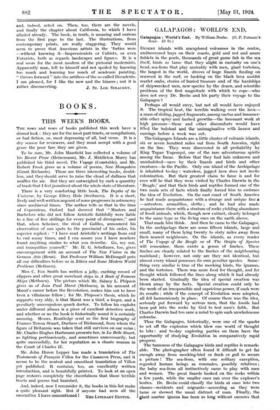BOOKS.
THIS WEEK'S BOOKS.
THE rows and rows of books published this week have a dismal look : they are for the most part tracts, or compilations, or bad fiction, or, most depressing of all, bad verse. It is a dry season for reviewers, and they must accept with a good grace the poor fare they are given.
To be sure, Mr. John Masefield has collected a volume of his Recent Prose (Heinemann), Mr. J. Middleton Murry has published his third novel, The Voyage (Constable), and Mr. Robert Frost gives us a volume of poems, New Hampshire (Grant Richards). Those are three interesting books, doubt- less, and they should serve to raise the cloud of dullness that muffles the air. But they are outweighed by such a quantity of trash that I feel jaundiced about the whole state of literature.
There is a very comforting little book, The Depths of the Universe, by George Ellery Hale (Scribners). It is a short, lively and well-written account of some progresses in astronomy since mediaeval times. The author tells us that in the time of Copernicus, Oxford had decreed that "Masters and Bachelors who did not follow Aristotle faithfully were liable to a fine of five shillings for every point of divergence," and that, when Scheiner, the rival of Galileo, announced his observation of sun spots to the provincial of his order, his superior replied : "I have read Aristotle's writings from end to end many times, and I can assure you I have nowhere found anything similar to what you describe. Go, my son, and tranquillize yourself." Mr. H. G. Scheffauer, too, gives encouragement with an account of The New Vision in the German Arts (Beim). But Professor William McDougall puts all our difficulties before us in Ethics and Some Modern World Problems (Methuen).
Miss C. Fox Smith has written a jolly, exciting record of clippers and other great merchant ships in A Book of Famous Ships (Methuen). The picture which Mr. Sidney L. Phipson gives us of Jean Paul Marat (Methuen), in his account of Marat's career before the Revolution, makes him out to have been a villainous fellow ; for Mr. Phipson's thesis, which he supports very ably, is that Marat was a thief, a forger, and a peculiarly unscrupulous quack doctor. To follow his exploits under different aliases is a piece of excellent detective work, and whether or no the book is historically sound it is certainly amusing. Messrs. Routledge send us the first biography of Frances Teresa Stuart, Duchess of Richmond, from whom the figure of Britannia was taken that still survives on our coins ; Mr. Charles Hughes Hartmann presents her, in La Belle Stuart, as fighting pertinaciously, and sometimes unnecessarily, but quite successfully, for her reputation as a chaste woman in the Court of Charles II.
Mr. John Heron Lepper has made a translation of The Testaments of Francais Villon for the Casanova Press, and it seems to be the neatest and smoothest translation of Villon yet published. It contains, too, an excellently written introduction, and is beautifully printed. To look at an open page restores completely the cheerfulness that those terrible tracts and poems had banished.
And, indeed, now I reconsider it, the books in this list make a quite pleasant sight. But if anyone had seen all the
enormities I leave unmentioned1 T A.O.. LITERARY EDITOR.










































 Previous page
Previous page